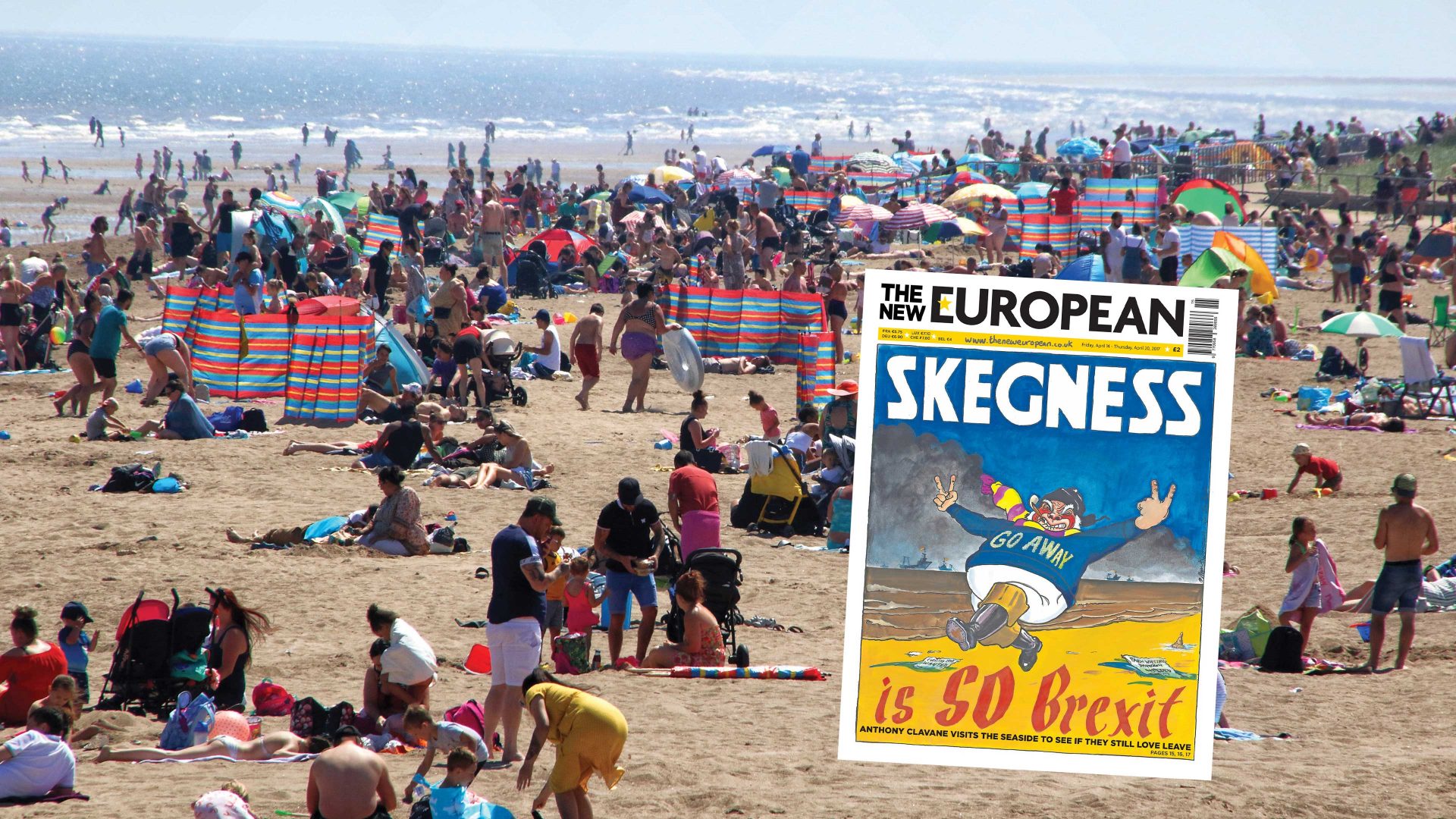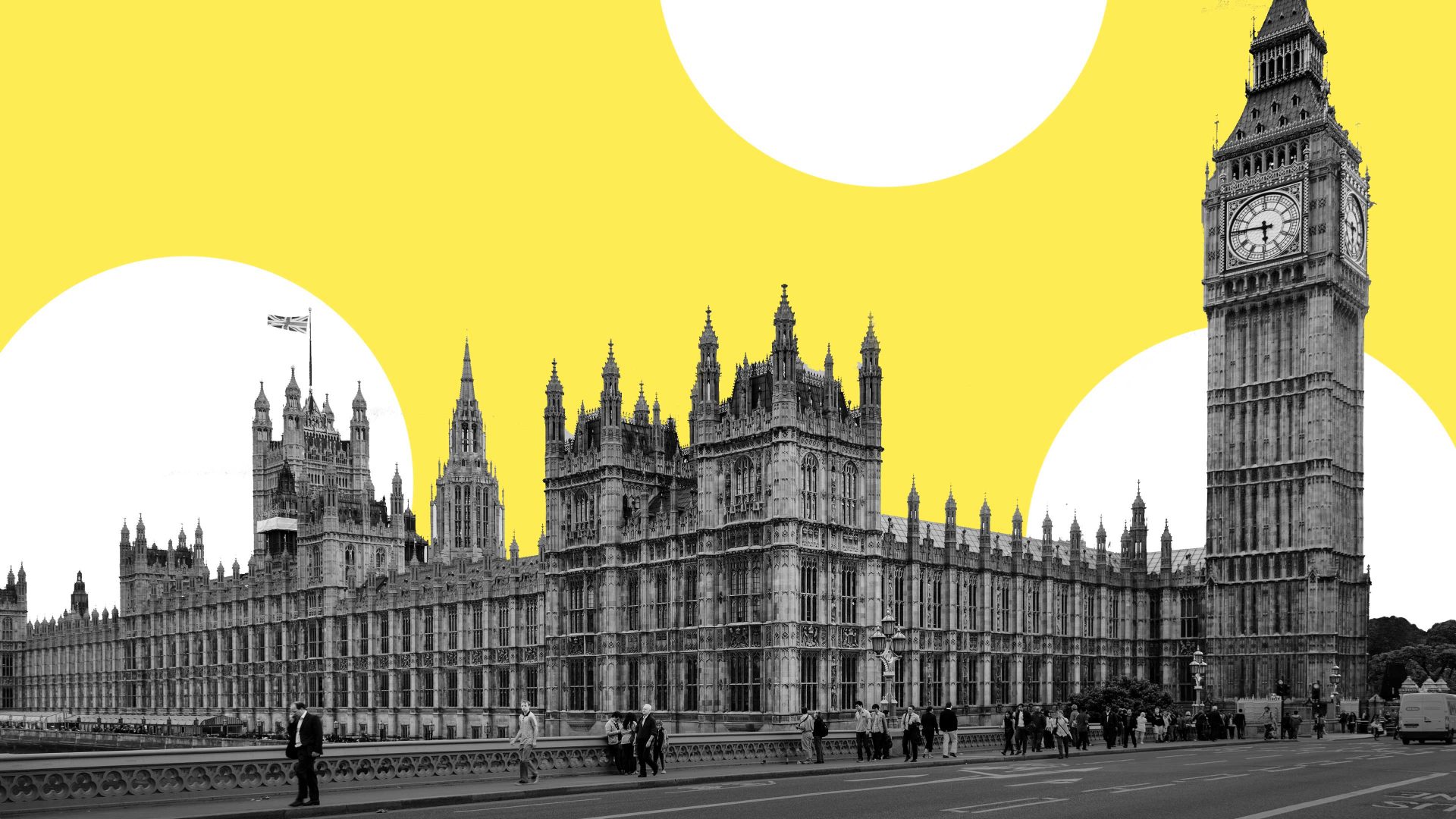It is a chilly, overcast , midweek day in late September. Skegness has a forlorn, end-of-season feel to it. The sea is grey. Just a few huddled walkers punctuate the great sandy beaches. The helter-skelters and rollercoasters, the gaudy amusement arcades, the bowling alleys and bingo halls, are mostly closed or deserted. A solitary couple from Leicester admire the seafront statue of the town’s famous mascot, a rotund, prancing, pipe-smoking Jolly Fisherman.
At peak season in July and August the population of this quintessentially British resort on Lincolnshire’s easternmost fringe swells to 200,000 or more, but most of the holidaymakers are now gone, leaving behind the 20,000 permanent residents and myself.
I have come to find out what Brexit has delivered for a town that the New European described as “Brexitland-on-Sea” shortly after Skegness had voted overwhelmingly to leave the European Union in the 2016 referendum. Of those who voted in the constituency of Boston and Skegness, 75.6% backed Leave, the highest percentage in the country. The figure would have been higher in agricultural Boston, where there was a huge backlash against the influx of east European farm workers, but even in East Lindsey, the district that encompasses Skegness, roughly 70% supported Brexit.
What I find is that nobody celebrates Brexit any more. I hear only a litany of complaints about the government’s failure to deliver the £350m a week that Boris Johnson pledged for the NHS, about its failure to curb immigration, to deliver much-vaunted trade deals, to sort out the Northern Ireland issue and – above all – to help left-behind places like Skegness. In 2013 the Office for National Statistics named it the most deprived seaside resort in Britain.
“Brexit?” snorts Alan, a retired market trader, as he walks his cockapoo along the seafront. “I think we were all sold a pup. Everyone thought it was going to be a be-all-and-end-all with the health service and so on, and we’d all be better off, but I don’t think we’ve seen any benefits, any advantages. I think you’ll get a lot of people with that view.”
Robert, a 67-year-old retired lorry driver, is trying – with little success – to sell plastic dolls from one of the clutch of steel shipping containers that make up Skegness market. “We were tricked. We were deceived,” he says. Politicians “used Brexit to get themselves into power. They said ‘we’ll get rid of this and that. Get us in and we’ll sort it’. But they conned us… there’s no way Brexit has benefited Skegness.”
Were Boris Johnson to walk past at this moment, Robert adds, “I’d gob on him. I’d spit on him.”
I can hear diehard Brexiteers protesting already. Trust the New European to seek out two disgruntled Leave voters and present them as the norm, they’ll be saying. But Tony Tye, the genial 76-year-old mayor of Skegness and former hotelier who voted Leave six years ago, is equally disillusioned and says he would probably vote Remain today.
“I just believe we were all hoodwinked by Boris Johnson,” he tells me as we sit in the living room of his comfortable semi-detached home a few streets back from the seafront. “His plan for coming out I thought was fantastic. When you look at it now you think, how much has changed from what he was saying? I don’t think he delivered on much at all.”
Even Danny Brookes and Mark Dannatt, two town councillors who were fervent Ukippers and Brexit apostles back in 2016, admit they are disappointed at how things have turned out, though they blame the way the government has executed Brexit rather than Brexit itself.
“What it’s done for me is shown me how incompetent the government is,” Brookes tells me as we sit, after hours, in his high street eatery, the Indulgence Cafe, where Nigel Farage addressed a throng of adoring supporters in 2015. “I think Brexit could have been a really good thing if it was run right… They shouldn’t have promised what they can’t deliver. It’s as simple as that.”
I find Dannatt at his seafront pub, the Seaview, though he had told me on the telephone that he would be away (Brexit is no longer a favourite topic of conversation in Skegness).
When I press him, he is unable to name a single way in which Skegness has benefited from Brexit. But he blames the Conservative government, not Leave campaigners like himself. “I don’t think anything has been delivered at this moment,” he says. “I think they made promises they knew they couldn’t deliver.”
Without those promises, of course, Leave might never have won the referendum. But we leave that unsaid.
Matt Warman, the fresh-faced Conservative MP for Boston and Skegness, says the constituency’s massive vote for Brexit in 2016 was essentially a cry for help, an explanation that I heard repeatedly while researching this article.
“What Skegness voted for was the ‘take back control’ message,” Warman tells me over coffee at Borough Market in London. “And it wasn’t just ‘take back control’ from the EU to the UK in policy terms. It was people who felt they’d been left behind by British governments for years and years and years.
“They wanted to use that vote both as a way of getting back control from the EU, but also to say to the establishment, the elite, that they had issues that hadn’t been addressed, and frankly that’s right. Look at the amount of money that’s been invested in coastal areas like Skegness in particular, and areas like Lincolnshire as a whole, and you’ve got a really good argument that says something needs to change.”
It is hard to argue with Warman’s assessment. Skegness looks and feels like a town that has been long neglected and starved of investment, a resort well past its heyday in that long-ago era before cheap package holidays to Europe came along.
It is still Britain’s fourth most popular resort, but it is served by no motorway, not even a dual-carriageway. A single very slow, two-coach train trundles across the flat, fertile, featureless Lincolnshire farmland from distant Nottingham each hour, but that is all. The town is at the end of the line, both literally and metaphorically.
There is no industry to speak of apart from tourism, which is highly seasonal. For nearly nine months of the year the town’s myriad B&Bs and cheap hotels stand shuttered. East Lindsey District Council turns the street lights off at midnight. In high summer the mobile telephone service cannot cope with the demand.
The town’s permanent population is elderly, poorly educated, largely dependent on benefits and, to judge by the extraordinary number of mobility scooters, in bad health. Many of its residents are retirees attracted by low property prices. You can buy a three-bedroom detached house for £200,000, or one of the many thousands of trailer homes that ring the town for £60,000. But getting a doctor’s or dentist’s appointment is, by all accounts, extremely difficult, and the nearest big hospital is 22 miles away in Boston.
Given all that, it is not hard to understand why the people of Skegness would have used the Brexit referendum to register a protest vote, especially when the likes of Farage, the Daily Mail and the Sun were blaming east European immigrants for lowering wages and stretching public services to breaking point. It is always tempting to look for scapegoats when things are bad, and in 2016 the resort had a lot of east Europeans working in the tourism industry and on nearby farms.
This is tricky territory for the New European. We caused outrage by illustrating our previous report from Skegness with a cartoon of the Jolly Fisherman wearing a jumper emblazoned with the words “Go Away” and making V-signs with both hands. But to deny there was a xenophobic element to the Brexit vote is scarcely plausible.
Mark Anderson, the town council’s sole Labour member and one of the few people who openly campaigned for Remain in 2016, says he received a lot of abuse, and “the worst bit was ‘you’re letting more immigrants in, you’re letting the Turks in’. Complete and utter lies, but they were spoon-fed by Johnson, Farage and co.” He was repeatedly told that “‘this country lets in lots of immigrants and they take all our benefits and housing and just push up the queues’, which is absolute tosh”. He points out that a lot of retirees came to Skegness (which is 98.5% white) to escape the multicultural cities of the Midlands: Nottingham, Leicester, Birmingham.
In a similar vein, a member of the Polish community who was quoted in our 2017 article tells me his contribution “resulted in numerous threats of violence to me and my family, which left my wife a nervous wreck”. Another Pole texts me after we speak to beg me not to identify her.
A young, baseball-capped scrapyard worker called Pete tells me Brexit is “a good thing because it gives us people who actually live round here a chance to get some help”.
Dannatt, the councillor, tells me: “We need… to look after what we’ve got here before we let other people in and start handing out money willy-nilly.”
Chris Baron ran the local (and original) Butlin’s camp for 20 years, and has been a leading light in efforts to regenerate Skegness’s economy. “If you do have areas of deprivation you sometimes look for people to blame for that deprivation and they blamed it on the east Europeans,” he says. “Maybe they looked at the east European people coming here and thought if they go away everything will get better… That was the easiest thing for people to pin something on.”
Jonathan Ling, who owns two amusement arcades and two bars in Skegness, agrees. “If you have someone with quite a few ‘z’s in their name living next door to you and you can’t get a doctor’s appointment, you’re going to blame them. The fact you’ve moved here with Type 2 diabetes and have to go to the doctor’s every day – it’s easy to blame other people but you have to look at yourself.”
It is not true that Brexit has done nothing for Skegness. It appears that the town’s cry for help was heard. For obvious reasons the EU grants for deprived areas that Skegness used to receive have now ceased, but last year the resort was awarded £24.5m by the government’s Towns Fund as part of Johnson’s levelling-up programme.
That money, and almost as much in matching funds, is to be used for an array of projects including the creation of a satellite campus of Grimsby’s further education college, opening a police training academy, restoring the dilapidated train station and improving the seafront. The future of the Butlin’s holiday camp also looks brighter, after it was bought back in September by its original owners in a £300m deal.
“We’ve had more investment in Skegness, Boston and Lincolnshire as a whole as a result of things like levelling-up funding than we have in a generation,” says Warman, the MP, though Anderson, the Labour councillor, claims a Tory government is merely “keeping its base happy with borrowed money”. It is also arguable that Brexit has benefited seaside resorts like Skegness by making it harder for Britons to visit Europe (witness the endless queues at Dover this summer). Visitor numbers have certainly been good for the past two years, though that could equally well be because of the Covid risks and restrictions that Brits have been facing when travelling abroad.
But the biggest downside of Brexit is an acute labour shortage caused, or at least exacerbated, by the departure of so many east European workers (again, the Covid pandemic is partly responsible). Tye, the mayor, reckons the town’s east European population has shrunk from more than 2,000 10 years ago to fewer than 500 now.
That shortage is driving up wages, which may or may not be a good thing, but it is hurting the town’s huge tourism and hospitality sector. Indeed, that sector now finds itself competing fiercely with Lincolnshire’s many fruit and vegetable farmers, some of whom are offering double the minimum wage to attract the pickers of cauliflowers and cabbages on whom they depend so heavily.
“We’re all scavenging for the same diminishing pool of labour,” says James Parker, operations director of a tangle of vertiginous big dippers and other attractions known as Fantasy Island. As many as 15% of his 250 peak-season staff used to be east Europeans. Now there are just two. It’s the same story everywhere. Ling has just spent around £300,000 refurbishing his Three Monkeys Bar and Grill on the seafront, but is unable to sell his customers any food because he cannot find the chefs he needs. “This year has been the most horrific year for staffing,” he says.
Stuart Hardy, co-owner of Hardy’s Animal Farm, was unable to offer his 40,000 visitors any hot meals in the attraction’s restaurant last year for lack of staff. This year is only marginally better. “There was some ideological stuff rushed through without appreciating the knock-on effects,” he says of Brexit’s ban on freedom of movement.
The problem is not just a lack of staff. It is a lack of good staff. “If you have the quantity you can focus on quality,” says Baron, the former Butlin’s chief whose 900 employees used to be roughly one-fifth east European.
“If you want to be successful in the hospitality industry you need to have choice when you’re employing people, and the east European market enabled us to have more choice. They were great workers. They were people who wanted to succeed. They didn’t come here to scrounge off our economy or anything like that. They came here to better themselves.”
Parker, of Fantasy Island, agrees. “We used to have some really good east Europeans. They thought they had won the lottery, earning decent money. They were keen to work, and that rubbed off. It changed (other employees’) work ethic,” he says. Now “we have to be more tolerant and more lenient of sloppy work. To a degree we’ve had to accept a lower work ethic.”
I heard numerous other complaints about Brexit during my two days in Skegness. Ride operators who buy their machines from the Netherlands and Belgium now struggle to get spare parts, or to have them serviced. Retirees can’t spend long winters in Spain. In the town’s only Polish shop, prices have shot up 20% because of import duties.
Warman, who actually voted to Remain, suggests there may be hidden advantages to Brexit. It may force farmers to mechanise rather than depend on cheap foreign labour, for example.
He says he is still confident the government will reach a sensible modus vivendi with Brussels, and a trade deal with the US. He argues that it is far too early to judge whether leaving the EU was a good or bad move. “The idea that something that took 40 years to get into is going to take a relatively short time to get out of, and that we’re going to see massive changes immediately, is just wilfully naive,” he says.
But for now, at least, the Jolly Fisherman seems to have lost his smile. There is no more heady talk of taking back control, regaining sovereignty, cutting red tape and unleashing Britain’s true economic potential. Levelling-up no longer appears to be a priority.
Moreover, Skegness is daily reminded of the government’s failure to fulfil one of its core Brexit promises – to secure the country’s borders. It has curbed the influx of valuable east European workers but, to the fury of many in the town, it has recently moved 120 young, male asylum seekers who crossed the Channel into three run-down hotels right on the seafront.
As Warman somewhat ruefully admits: “It’s a bit of a red rag to a bull.”



